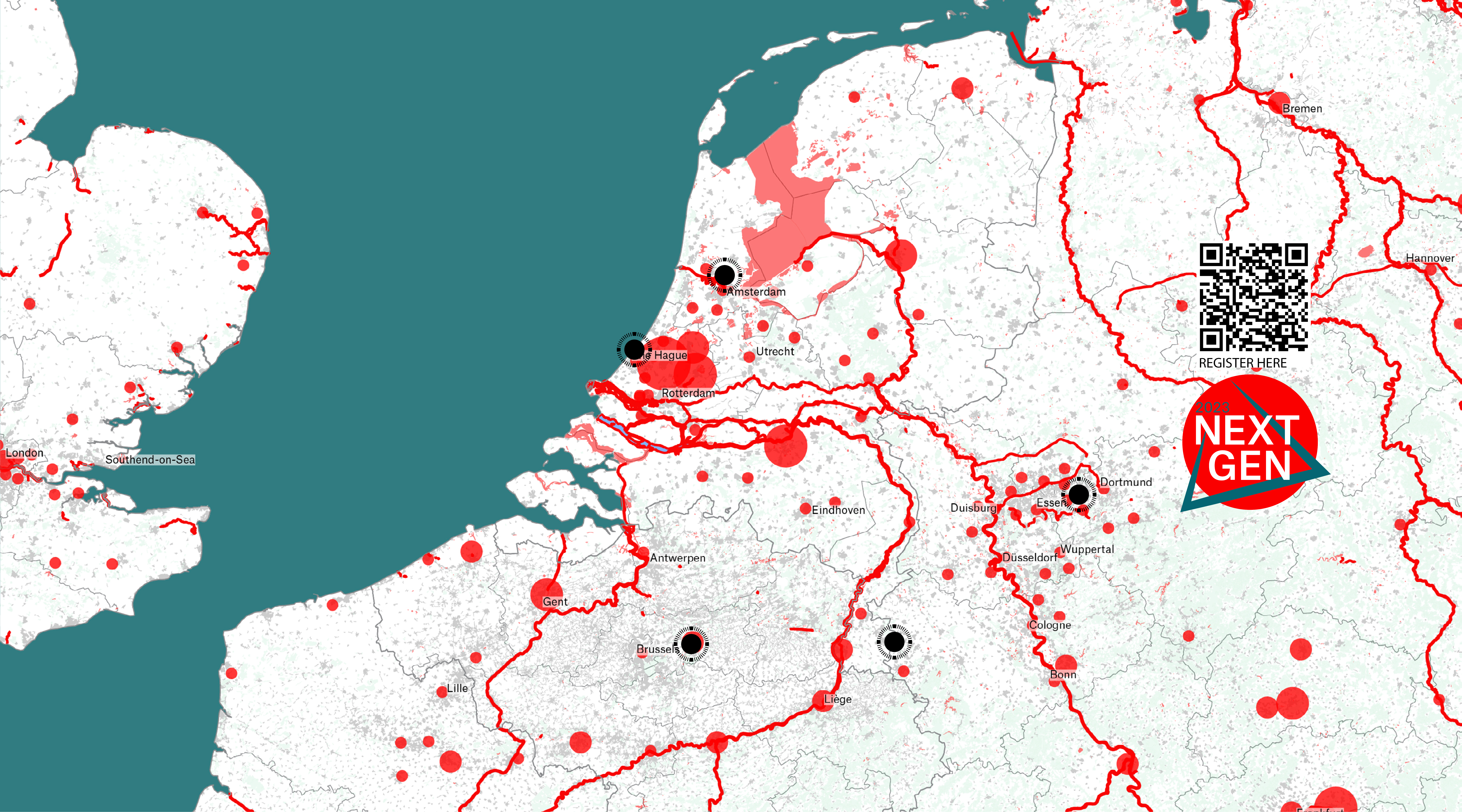Online Symposium
Reflections from Next Generation Podium for Eurodelta 2023
07 juni 2023
We are proud to present the results from the workshop with young designers, planners, architects and spatial thinkers hosted by us on the 11-12 of May.
A plea for working on mega-region scale
50 participants, 7 teams, 1 goal – Plan of Action for Eurodelta megaregion.
Solving the urgency and challenges of circularity, mobility, water, and societal relations with the gaps from local to cross-border megaregion scale requires out-of-the-box solutions. The participants were urged to work at 3 scales – beginning at the local/city level (project scale), expanding it to the regional/cross-border level (planning scale), and then analyzing its effects on the mega-regional level (impact scale).
On the Eurodelta scale, a plan of action should be centered on comprehending the realities of the area, prioritizing inhabitants’ well-being, dealing with urgent challenges, and incorporating group decision-making. By doing this, the plan can seek to produce favorable results, enhance the quality of life for residents of the Eurodelta region, and successfully address pressing challenges and possibilities there.
Opening Ceremony
Watch the full Opening Ceremony here
Alankrita Sarkar (Delta Metropolis Association) and Dr. Cecilia Braun (Braun-Urban) reinstated the purpose of Next Generation Podium for Eurodelta as part of the Opening Ceremony – Phase 2.
“The goal is to provide the next generation of young designers and planners with the stage where they can investigate and present their own ideas, strategies and visions on how to strengthen the mega region of Eurodelta” – Alankrita Sarkar
“I think it’s important to remain having these very close bonds with the next generation, it is important to do this from a bottom up local and regional level to create a better understanding of what the Eurodelta is” – Dr. Cecilia Brown
Dagmar Kein (SURE Network, Municipality of Amsterdam) explained what the megaregion of Eurodelta is and how SURE Network positions itself strongly in the entire Eurodelta discussion.
“In my opinion, where nature and culture mix are where we have a delta, an extremely busy area with waterways and harbors that connect each city this is the foundation of the Eurodelta” Dagmar Kein
Paul Gerretsen (Vereniging Deltametropool) reflected on the lunch forum which was a part of New York Water Week 2023.
“I thought that it was very inspiring to see first-hand experiences from those who are wanting to change their way of working and the importance of this change.” Paul Gerretsen
The first keynote presentation was by Ivo Cré (POLIS Network) where he explained the responsibility of working in the multifaceted metropolitan mobility transition as an approach.
“One very important element is planning, there are a couple of targets that have been set by cities and regions in view of changing the metropolitan mobility behavior. With targets for public transport, reducing car and really moving active travel as a principal mode in the daily mobility system.” Ivo Cre
The second keynote speaker, Kersten Nabielek (PBL Netherlands Environmental Assessment Agency), gave a presentation about how to rethink scenario research and use it as a tool through the 4 Spatial Scenarios of The Netherlands as an example.
“The main point is that scenarios are not really meant as a prediction of the future, but they are much more a tool for discussions and workshops. So, if we show different options, images and maps of the future it helps policymakers and planners to broaden their horizon.” Kersten Nabilek
Conclusions from Opening Ceremony
On the Eurodelta scale, scenario thinking plays a crucial role in the planning process. From decision-making, developing innovations, and well-rounded planning approaches scenario thinking can serve as valuable tools for creating plan of actions. This supports discussions, broadens perspectives, and enhances the planning process on the Eurodelta scale. By incorporating scenarios into the plan of action, policymakers and planners can make informed decisions, encourage participation, stimulate innovation, and develop a more comprehensive and adaptable approach to address the challenges and opportunities within the Eurodelta area.
From the perspective of Accessible Delta, the discussion reaffirms that a plan of action is needed to transform the way people move within this megaregion. This should include targets for public transport, reducing car usage, and promoting active travel as the primary mode of transportation in daily mobility systems. Policy makers, urban planners and designers would need this plan which involves cross-sectoral strategies. The implementation of this plan would aim to create a more sustainable, efficient, and people-centered transportation system in the Eurodelta mega-region.
Online workshop
After the opening ceremony, the participants were divided into teams to start the workshop towards developing a ‘Plan of Action for the Eurodelta’ to solve the urgencies and challenges of circularity, mobility, water, and societal relations with the gaps from local to cross- border mega region scale. The participants were urged to work across scales- beginning at the local/city level (project scale), expanding it to the regional/cross-border level (planning scale), and then analyzing its effects on the mega-regional level (impact scale ).
Team 1 Double Mining System for Waste Management
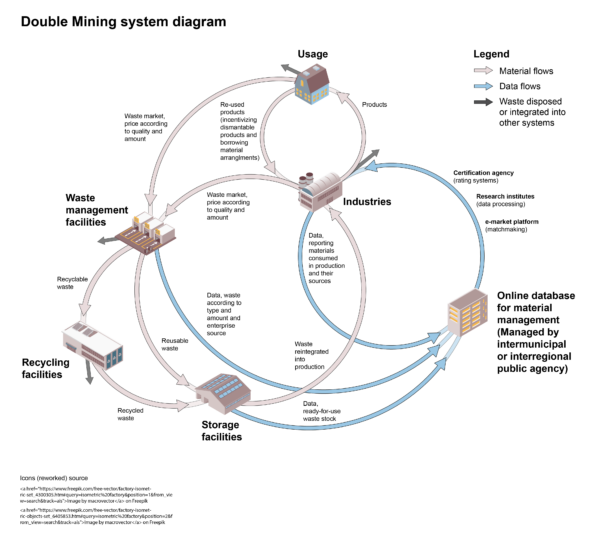
With the construction industry as a starting point and a broader scale, the proposed project seeks to build effective waste and data mining systems. By using regulatory, economic, and soft instruments like monitoring systems, financial incentives, punishments, and open databases, it aims to create a circular economy model. To create an e-market that matches users with available materials and more sustainably and independently produced goods in the Eurodelta, the project mandates reporting of material flows to an open database for research and supports waste reduction and the use of recycled resources.
Team 2 Reshaping the Industrial Belt
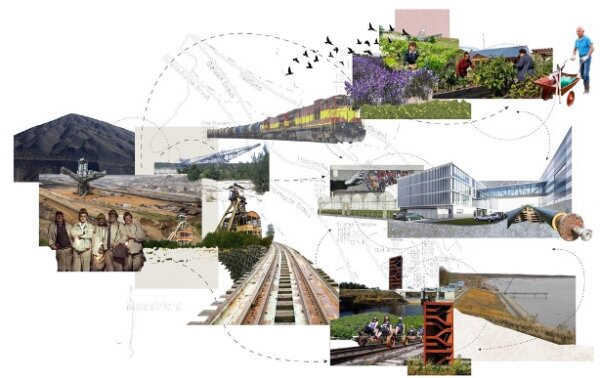
The Eurodelta region, which was once wealthy and industrialized but is now experiencing unemployment and environmental deterioration because of the shut-down coal mines, offers a chance for change. The idea behind “Re-Shaping the Industrial Belt” is to turn abandoned industrial and mining zones into production, research, and tourism hubs connected by an existing train network. As part of this strategy, parks, architectural endeavors, and community centers will be built for recreational purposes. Research and management hubs will be attracted, and renewable energy and social housing will be developed on formerly industrial and mining lands. Through a land trust model, the strategy places an emphasis on community management and public services.
Team 3 Dear Passenger, Please Refer to the More Sustainable Trip!
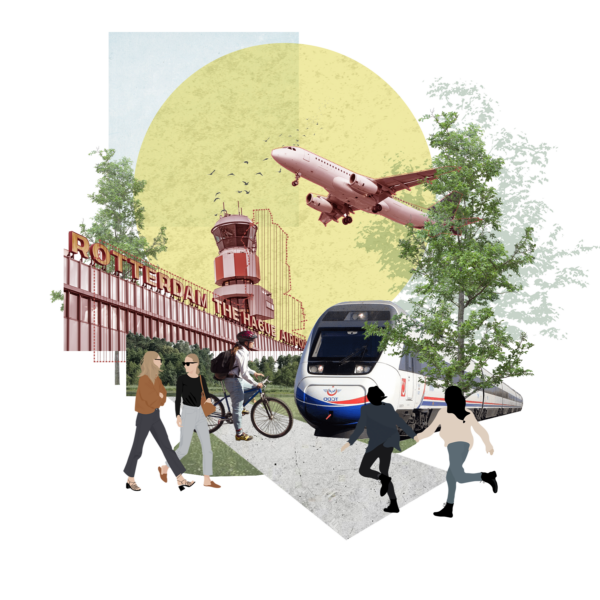
The project’s major objective is to shut down Rotterdam Airport and create new neighborhoods to meet the city’s housing issues. To do this, it would be necessary to switch to alternate modes of transportation, enhance regional connectivity, and develop new uses for the land. As part of the proposal, airports in the Eurodelta region would work better together, and sustainable transportation initiatives like switching domestic flights to trains and expanding railroads that require funding for upkeep and more traffic would be promoted.
Team 4 Collaborative Cross-Border Platform
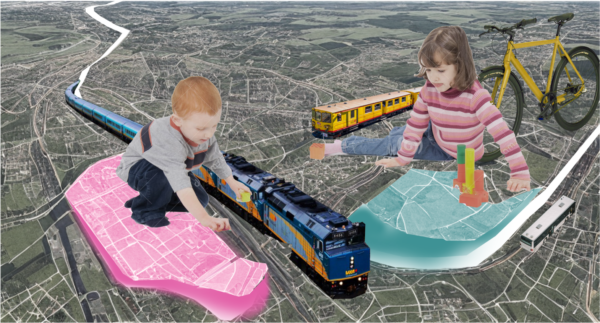
In the Eurodelta Region, weak cross-border linkages have been noted, notably between small and medium-sized cities that are nearby. Differences between the governments, legislation, stakeholders, and ownership of the infrastructure in Germany and the Netherlands are blamed for the lack of connection. An initiative to build a collaborative cross-border platform for managing mobility services, encouraging knowledge sharing, and enhancing intermodal nodes and bike lanes has been launched as part of a pilot project in Venlo to address this issue. With intentions to expand the project throughout the entire Eurodelta Region if it is successful, the project’s goal is to transition to a post-car situation by focusing on sustainable modes of transportation and encouraging a sense of community.
Team 5 The Gears of Progress
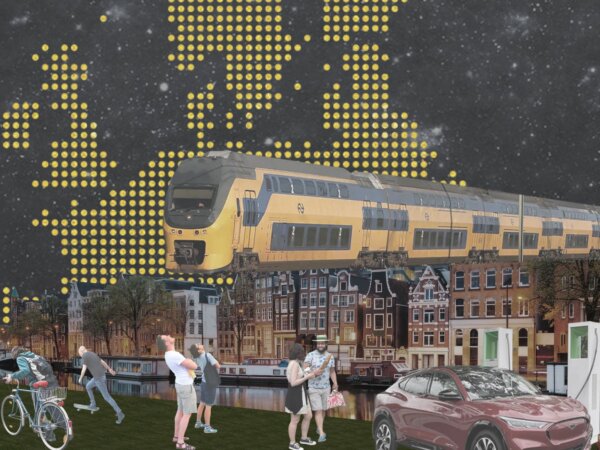
When creating practical solutions for connection and accessibility problems, cities pursuing carbon neutrality should put local factors and territorial realities first. Within a larger international framework, local solutions can serve as catalysts for an ecological shift in which individual motorized mobility is replaced by feasible public transportation options. Neighborhood regeneration is aided by the introduction of Zero (or low) Emission Zones (ZEZ), which is driven by an international partnership of stakeholders who are aware of the distinctive qualities of various parts of cities. By integrating these ZEZ, the city may be strengthened in other areas and cross-border cooperation between cities in the Eurodelta region may be encouraged.
Team 6 Cross Boundary Riverscape along the Rhine and Ruhr
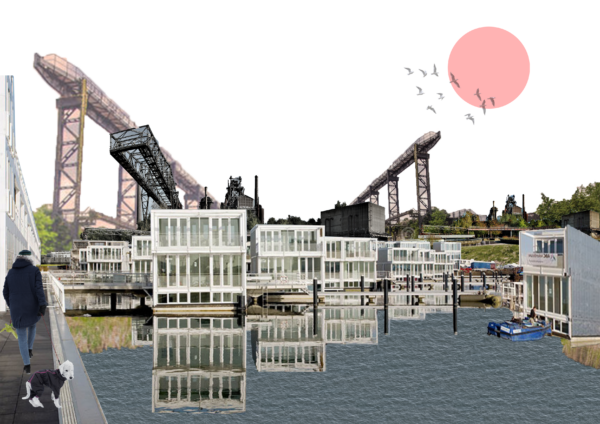
The project focuses on Duisburg, a German city that struggles with water shortages and flooding because of its inland port and industrial past. Formerly active industrial zones around the Rhine and Ruhr rivers provide citizens the chance to rediscover their connection to nature and culture by constructing adaptable sociocultural areas known as “Riverscapes.” A policy instrument is created to aid in decision-making, considering the following factors: governance (integrating different land uses), identity (reflecting common heritage), and emergency (enabling water to enhance natural cycles). The initiative involves enhancements to bike connections, a yearly Rhine festival, and interventions in urban, agricultural, and recreational contexts that serve as models for upscaling throughout the Eurodelta megaregion.
Team 7 Four Directions Towards Transformation
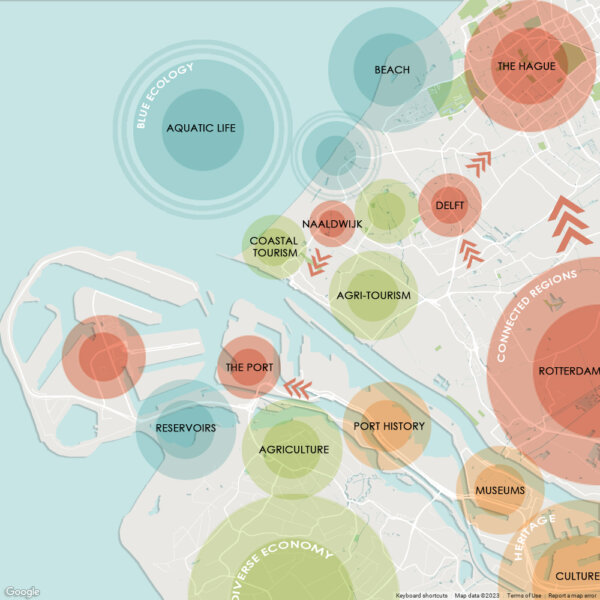
With an emphasis on a diverse economy, blue environment, restored history, and a connected region, the initiative suggests setting out four directions for the delta region. These guidelines support sustainable transportation and efficient logistics while encouraging sustainability, resilience, and identity. Two strategies are being put into action in the Hook of Holland region: creating marine protected areas to protect habitats and species and integrating waterways with soft mobility modes like bicycle and pedestrian paths to improve connections and promote a softer mobility culture throughout delta regions.
Closing Cerenomy
Watch the full Closing Ceremony here
The final step of the Online working conference the participants were requested to submit their findings and present a pitch to the jury members which included Kersten Nabielek (PBL), Nina Nesterova (Breda University of Applied Science) Carola Hein (LDE PortCityFutures ), Marie- Hanna Deketeneare (Ministry of Transition and Ecology, France), Dr. Cecilia Braun ( Braun-Urban, EGTC Rhine Alpine Corridor) and the Members of the SURE Network. The jury engaged with the student teams offering them feedback on the proposals they had put forward.
The Online Working Conference was finalized with a few closing statements from the jury members together with Valeria Fedeli (Politecnico di Milano) and Erik Pasveer (Gemeente Amsterdam, SURE Network).
Valeria Fedeli closed the ceremony by voicing her experience throughout the Online working conference, she pointed out how these innovative approaches will positively affect the traditional point of view towards urban planning and design. She suggested that the ideas can be branched out to other places outside the Eurodelta mega-region..
“I also appreciate the fact that we have been working on systemic and strategic approaches at the same time. Looking at the process and stakeholder that being actively involve and not just design.” Valeria Federi
A holistic, strategic approach, active participation of stakeholders, and attention to the planning process itself are all important components of a plan of action on the Eurodelta scale. Aiming to address the region’s complexity, setting long-term goals, including stakeholders, and developing a comprehensive and inclusive strategy for the Eurodelta area’s sustainable development are all possible with such an approach.
This statement was followed by Erik Pasveer (City of Amsterdam and SURE Network) who reflected on this edition of the Next Generation Podium and what are not next steps.
“A major issue for me is how can we come to some sort of idea or understanding of this reality as an object of planning and decision making that will benefit the people living in the Eurodelta, so it’s an important, relevant and quite urgent task” by Eric Pasveer
On the Eurodelta scale, a plan of action should be centered on comprehending the realities of the area, prioritize inhabitants’ well-being, deal with urgent challenges, and incorporate group decision-making. By doing this, the plan can seek to produce favorable results, enhance the quality of life for residents of the Eurodelta region, and successfully address pressing challenges and possibilities there.
